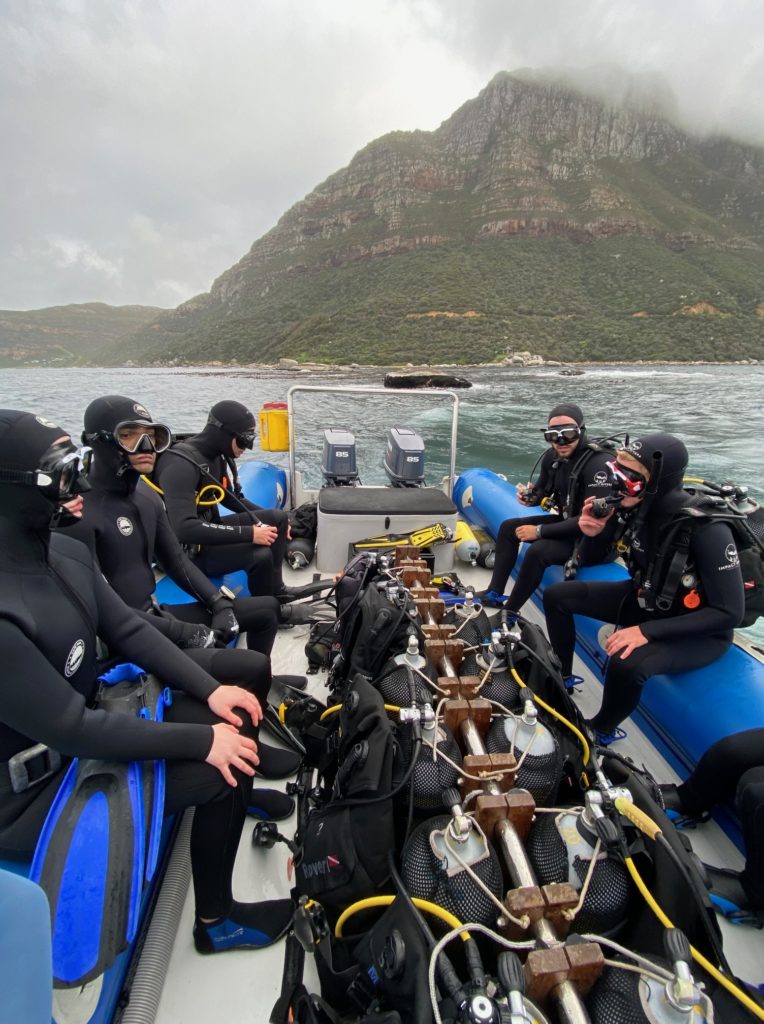Cape RADD is located in the picturesque Simon’s Town, nestled within the Western Cape of South Africa, on the stunning shores of False Bay. This prime location offers access to a diverse range of marine habitats, from kelp forests and rocky reefs to shipwrecks and open water, making it an ideal setting for marine research and education. The proximity to both the Atlantic and Indian sides of the Cape Peninsula allows for a rich variety of marine life, including over 3500 endemic species, and provides a fantastic array of dive sites for researchers and students alike. Simon’s Town itself is a hub of activity with beautiful beaches, a mountainous backdrop, and is only 40 km from Cape Town’s city center, offering a blend of natural beauty and convenience for those visiting Cape RADD.

False Bay, a jewel of biodiversity nestled along the South African coast, is renowned for its unique ecosystem shaped by the confluence of the cold Benguela current and the warm Agulhas current. This marine crossroads fosters an extraordinary array of life, from the vibrant nudibranchs, flaunting their bright colors as a warning of toxicity, to the ancient-looking seven-gill cow sharks, unchanged for millions of years. The bay’s waters, enriched by nutrient-dense upwellings, support a thriving kelp forest ecosystem, providing shelter and sustenance to a myriad of species, including endemic sharks, mud snails, and urchins. The dynamic interplay of currents, nutrients and habitats in False Bay culminates in a hotspot of endemism and biodiversity, making it a fascinating subject for marine research and a spectacular destination for diving and snorkeling.
Students at Cape RADD are immersed in a transformative experience that extends beyond marine biology and into the vibrant culture of South Africa. The program offers a hands-on approach to learning, where students can directly apply their knowledge in the field, often within the same day as their lectures. This dynamic educational setting is complemented by the rich cultural tapestry of Simon’s Town, a historic locale known for its quaint architecture, diverse marine life, and the iconic African penguins of Boulders Beach. Students not only develop their scientific skills but also engage with the local community, savoring the flavors of South African cuisine and embracing the nation’s spirit of Ubuntu—a philosophy emphasizing humanity towards others. The Cape RADD experience is a harmonious blend of rigorous academic pursuit and cultural exploration, leaving students with a profound understanding of marine conservation and a deep appreciation for the country’s heritage.

The Cape RADD program is designed for individuals passionate about the marine environment, conservation, and research. It caters to a diverse audience, including:
- Students and Graduates: Those studying marine biology or related fields who seek hands-on field experience.
- Dive Professionals: Divers looking to expand their knowledge and contribute to marine research.
- Early Career Scientists: Emerging scientists interested in practical and theoretical aspects of marine science.
- Ocean Enthusiasts: Anyone with a love for the ocean and a desire to participate in citizen science projects.
The program offers SCUBA and freediving training courses, data collection techniques, and workshops, aiming to train participants in marine research and conservation efforts.
It’s not all work, as well as your field biologist training and participating in scientific diving collecting data for conservation research projects, you will have the chance to explore and experience the beautiful city of Cape Town and its surroundings. Cape Town offers a plethora of activities for students to enjoy during their free time, catering to a wide range of interests:

- Kirstenbosch National Botanical Garden: A world-renowned botanical garden perfect for nature lovers and those seeking tranquility.
- Hike Table Mountain: For the adventurous, hiking Table Mountain provides breathtaking views and a rewarding challenge.
- Cape Town Beaches: The city’s beaches are ideal for sunbathing, surfing, or just relaxing by the sea.
- Cultural Sites: Explore the rich history and culture by visiting museums, galleries, and the vibrant neighborhoods of Bo-Kaap and Woodstock.
- Culinary Experiences: Savor the local flavors at the numerous cafes, markets, and restaurants offering a taste of South African cuisine.
These activities not only offer relaxation and fun but also a chance to experience the unique culture and natural beauty of Cape Town
The Cape RADD training program is an opportunity for hands on learning whilst contributing to meaningful scientific work and to explore the marine world in one of the most beautiful settings on earth.

